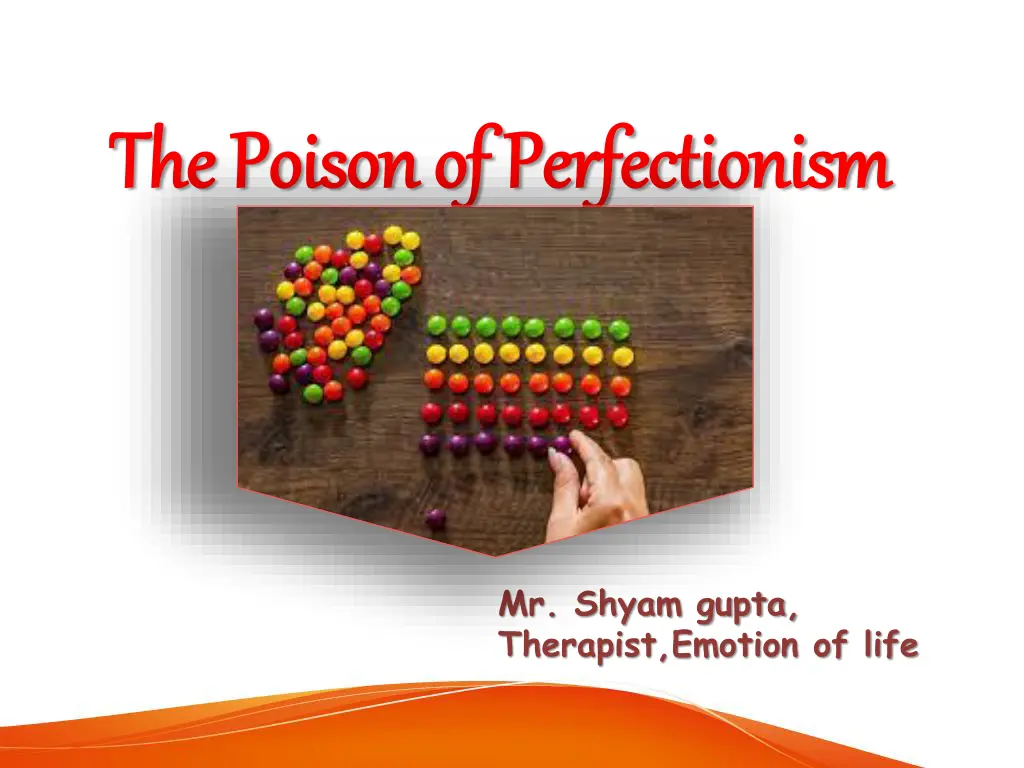
Understanding Perfectionism: The Psychological Effects
Explore the dimensions of perfectionism, from normal vs. neurotic traits to the psychological implications such as body image dissatisfaction and self-oriented perfectionism. Discover the components and implications of perfectionism in different contexts, shedding light on how it influences individuals' behaviors and emotions.
Download Presentation

Please find below an Image/Link to download the presentation.
The content on the website is provided AS IS for your information and personal use only. It may not be sold, licensed, or shared on other websites without obtaining consent from the author. If you encounter any issues during the download, it is possible that the publisher has removed the file from their server.
You are allowed to download the files provided on this website for personal or commercial use, subject to the condition that they are used lawfully. All files are the property of their respective owners.
The content on the website is provided AS IS for your information and personal use only. It may not be sold, licensed, or shared on other websites without obtaining consent from the author.
E N D
Presentation Transcript
The Poison of Perfectionism The Poison of Perfectionism Mr. Shyam gupta, Therapist,Emotion of life
MEANING Perfectionism Perfectionism, inpsychology, is apersonality traitcharacterized by a person's striving for flawlessness and setting high performance standards, accompanied by critical self-evaluations and concerns regarding others' evaluations.
Normal vs. Neurotic Normal perfectionists Normal perfectionists are more inclined to pursue perfection without compromising their self-esteem, and derive pleasure from their efforts. Neurotic perfectionists Neurotic perfectionists are prone to strive for unrealistic goals and feel dissatisfied when they cannot reach them.
STRIVINGS VS. CONCERNS Perfectionism consists of two main dimensions: Perfectionistic strivings Perfectionistic concerns.
Psychological implications Socially prescribed perfectionism in young women has been associated with greater Socially prescribed perfectionism in young women has been associated with greater body body- -image dissatisfaction and avoidance of social situations that focus on weight image dissatisfaction and avoidance of social situations that focus on weight and physical appearance. and physical appearance. Perfectionists are obsessives who need to feel in control at all times to protect Perfectionists are obsessives who need to feel in control at all times to protect themselves and ensure their own safety. themselves and ensure their own safety.
Components of Perfectionism Self Self- -oriented perfectionism oriented perfectionismis an intrapersonal dimension characterized by a is an intrapersonal dimension characterized by a strong motivation to be perfect, setting and striving for unrealistic self strong motivation to be perfect, setting and striving for unrealistic self- - standards, focusing on flaws, and generalization of self standards, focusing on flaws, and generalization of self- -standards. Other Other- -oriented perfectionism oriented perfectionisminvolves similar behaviors, but these behaviors are involves similar behaviors, but these behaviors are directed toward others instead of toward the self. directed toward others instead of toward the self. Self Self- -oriented oriented Socially prescribed perfectionism Socially prescribed perfectionismentails the belief that others have perfectionistic expectations and motives for oneself. have perfectionistic expectations and motives for oneself. standards. entails the belief that others
Positive aspects Drive people to accomplishments and provide the motivation Preferences for order and organization, a persistent striving for excellence, and conscientious orientation to tasks and performance . Exceptionally talented people and geniuses are also often perfectionists.
Negative Aspects Perfectionism has been associated with numerous other psychological and physiological complications: Suicide Anorexia nervosa Medical complications Narcissism General Applications
Negative Aspects Suicide Anorexia Nervosa The tendency of perfectionists to have The tendency of perfectionists to have excessively high expectations of self and to excessively high expectations of self and to be self be self- -critical when their efforts do not critical when their efforts do not meet the standard they have established meet the standard they have established combined with their tendency to show a combined with their tendency to show a "perfect face" to the world increases their "perfect face" to the world increases their risk of risk ofsuicide ideation suicide ideationwhile decreasing the likelihood they will seek help when they likelihood they will seek help when they should. should. Perfectionism is a life enduring trait in the Perfectionism is a life enduring trait in the biographies of anorexics. It is felt before the biographies of anorexics. It is felt before the onset of the eating disorder, generally in onset of the eating disorder, generally in childhood, childhood,during the illness , and also, during the illness , and also, after remission. after remission. The incessant striving for thinness among The incessant striving for thinness among anorexics is itself a manifestation of this anorexics is itself a manifestation of this trait, of an insistence upon meeting trait, of an insistence upon meeting unattainably high standards of unattainably high standards of performance. performance. while decreasing the
Negative Aspects General Applications Medical complications In the workplace, perfectionism is often marked In the workplace, perfectionism is often marked by low by lowproductivity productivityand missed deadlines. This and missed deadlines. This can lead to can lead todepression, depression,social alienation, and a social alienation, and a greater risk of workplace "accidents". greater risk of workplace "accidents". In intimate relationships, unrealistic In intimate relationships, unrealistic expectations can cause significant expectations can cause significant dissatisfaction for both partners. dissatisfaction for both partners. They may be inflexible to change and lack They may be inflexible to change and lack creativity if problems arise. creativity if problems arise. Perfectionism is a risk factor for Perfectionism is a risk factor forobsessive compulsive disorder, compulsive disorder,obsessive compulsive obsessive compulsive personality disorder, personality disorder,eating disorders, eating disorders,social anxiety, anxiety,social phobia, social phobia,body dysmorphic disorder, disorder,workaholism, workaholism,self harm, abuse, and abuse, andclinical depression clinical depressionas well as physical problems like problems likechronic stress, and chronic stress, andheart disease. obsessive social body dysmorphic self harm,substance as well as physical heart disease. substance
Narcissism Narcissists often are pseudo Narcissists often are pseudo- -perfectionists and require being the center of attention and create perfectionists and require being the center of attention and create situations where they will receive attention situations where they will receive attention.
Signs Youre a Perfectionist You can not stop thinking about a mistake you made. You are intensely competitive and can't stand doing worse than others. You either want to do something just right or not at all. You demand perfection from other people. You will not ask for help if asking can be perceived as a flaw or weakness. You will persist at a task long after other people have quit. You are a fault-finder who must correct other people when they are wrong. You are highly aware of other people's demands and expectations. You are very self-conscious about making mistakes in front of other people. *You noticed the error in the title of this list *You noticed the error in the title of this list
Common Traits of a Perfectionist The following are ten traits of perfectionists, that you may be able to spot in yourself or in the people you know. All-or-Nothing Thinking Highly Critical Pushed by Fear Unrealistic Standards Focused on Results Depressed by Unmet Goals Fear of Failure Procrastination Defensiveness Low Self-Esteem
DOMAINS OF PERFECTIONISM In the workplace or at school In the workplace or at school Intimate relationships or Intimate relationships or friendships friendships Physical activity Physical activity Environment or surroundings Environment or surroundings Hygiene and health Hygiene and health How one speaks or writes How one speaks or writes Physical appearance Physical appearance
Causes of Perfectionism Rigid, high parental expectations Highly critical, shaming, or abusive parents Excessive praise for your achievements Low self-esteem or feeling inadequate Believing your self-worth is determined by your achievements Black-and-white thinking Efforts to feel in control Cultural and institutional expectations
4 Parenting Styles That Contribute to Perfectionism Demanding Parents Demanding parents value achievements Demanding parents value achievements awards, grades, money, and titles awards, grades, money, and titles people think. people think. Demanding parents tend to tell their children what to do rather than ask what Demanding parents tend to tell their children what to do rather than ask what the child wants, needs, or feels. the child wants, needs, or feels. Children with demanding parents become extremely hard on themselves. They Children with demanding parents become extremely hard on themselves. They constantly feel like they aren t living up to their parents expectations, leaving constantly feel like they aren t living up to their parents expectations, leaving them with a sense of shame, failure, and inadequacy. They internalized their them with a sense of shame, failure, and inadequacy. They internalized their parents goals and expectations. parents goals and expectations. They also learn that love is conditional They also learn that love is conditional please others. Perfection becomes a way to gain acceptance, love, and praise. please others. Perfection becomes a way to gain acceptance, love, and praise. external markers of success such as external markers of success such as and are overly concerned with what other and are overly concerned with what other that they are loveable only when they that they are loveable only when they
Perfectionist Parents Perfectionism can also be learned by children growing up with goal Perfectionism can also be learned by children growing up with goal- -oriented, driven, perfectionist parents who modeled or rewarded this way of thinking and driven, perfectionist parents who modeled or rewarded this way of thinking and acting. acting. Perfectionism is encouraged when children are praised excessively for their Perfectionism is encouraged when children are praised excessively for their achievements rather than their efforts or progress. The focus is on what the child achievements rather than their efforts or progress. The focus is on what the child accomplishes rather than the process accomplishes rather than the process or who he is as a person. They model their value of a perfect family, house, and appearance through They model their value of a perfect family, house, and appearance through achieving at extremely high levels and attaining academic, career, or monetary achieving at extremely high levels and attaining academic, career, or monetary success. success. oriented, or who he is as a person.
Distracted Parents A distracted parent could be one who works eighty hours a week and isn t A distracted parent could be one who works eighty hours a week and isn t physically or emotionally available. physically or emotionally available. Distracted parents usually meet their children s physical needs but often neglect Distracted parents usually meet their children s physical needs but often neglect their emotional needs. their emotional needs. Perfectionism is a way for children of distracted parents to either get noticed or help Perfectionism is a way for children of distracted parents to either get noticed or help their parents out. their parents out. They may not outwardly demand perfection, but some such parents give the They may not outwardly demand perfection, but some such parents give the message that success is what makes you worthwhile, while others relay the message message that success is what makes you worthwhile, while others relay the message that the child isn t enough to garner their attention. that the child isn t enough to garner their attention.
Overwhelmed Parents Some parents are chronically overwhelmed due to their own trauma, mental Some parents are chronically overwhelmed due to their own trauma, mental illness, illness,addiction, or cognitive impairment or by chronic stressors such as a very sick addiction, or cognitive impairment or by chronic stressors such as a very sick child, unemployment, poverty, health problems, or living in a violent community. child, unemployment, poverty, health problems, or living in a violent community. There is either a lack of consistent rules and structure or overly harsh or arbitrary There is either a lack of consistent rules and structure or overly harsh or arbitrary rules. rules. Children develop perfectionist traits as a way to compensate for feelings of blame Children develop perfectionist traits as a way to compensate for feelings of blame and a deep sense of being flawed and inadequate. and a deep sense of being flawed and inadequate.
Treatments Cognitive Cognitive- -behavioral therapy behavioral therapyhas been shown to successfully help perfectionists in has been shown to successfully help perfectionists in reducing social anxiety, public self reducing social anxiety, public self- -consciousness, obsessive consciousness, obsessive- -compulsive disorder (OCD) behaviors, and perfectionism. (OCD) behaviors, and perfectionism.By using this approach, a person can begin to By using this approach, a person can begin to recognize their irrational thinking and find an alternative way to approach recognize their irrational thinking and find an alternative way to approach situations. situations. Exposure and response prevention Exposure and response prevention(ERP) is also employed by psychologists in the (ERP) is also employed by psychologists in the treatment of obsessive treatment of obsessive- -compulsive symptoms, including perfectionism. This form of compulsive symptoms, including perfectionism. This form of therapy is premised on encouraging individuals to stop their perfectionistic therapy is premised on encouraging individuals to stop their perfectionistic behavior in tasks that they would normally pursue toward perfection. behavior in tasks that they would normally pursue toward perfection. compulsive disorder
Treatments Acceptance Acceptance- -based behavior therapy (ABBT) was demonstrated to have based behavior therapy (ABBT) was demonstrated to have increasing awareness, increasing acceptance, and living a meaningful increasing awareness, increasing acceptance, and living a meaningful life. life.These practices were shown to help reduce anxiety, depression, and These practices were shown to help reduce anxiety, depression, and social phobia. This approach has been shown to be effective six months social phobia. This approach has been shown to be effective six months post to the therapy. post to the therapy.
Recommendations - How to make the best of their innate temperament. Learn to relax and trust that the world will not come to an end if you aren t always on Learn to relax and trust that the world will not come to an end if you aren t always on watch. watch. Have patience and understand that not everyone sees things the same way as you. Have patience and understand that not everyone sees things the same way as you. Allow others as well as yourself to make mistakes without becoming overly annoyed or Allow others as well as yourself to make mistakes without becoming overly annoyed or irritated. irritated. Get in touch with your emotions and understand they are a vital and valid part of you Get in touch with your emotions and understand they are a vital and valid part of you rather than something that must be ignored and contained. rather than something that must be ignored and contained. Step back and try to understand that your repressed and self Step back and try to understand that your repressed and self- -righteous anger toward others not doing the right thing as prescribed by you damages your relationships. It others not doing the right thing as prescribed by you damages your relationships. It also proves harmful to your own physical and emotional wellbeing. also proves harmful to your own physical and emotional wellbeing. righteous anger toward
THANK YOU Contact us at info@emotionoflife.in Contact us at info@emotionoflife.in www.emotionoflife.in www.emotionoflife.in






















